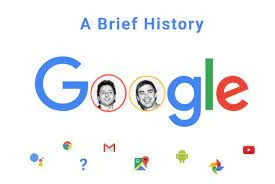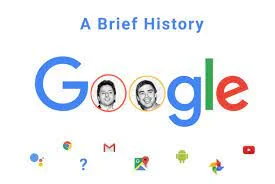
History of Google: How Two Students Created the World’s Biggest Search Engine
- Book My Author
- Technology
- 2025-09-23 01:43:22
- 913K
History of Google: How Two Students Created the World’s Biggest Search Engine
Introduction
In the late 1990s, the internet was a rapidly growing but chaotic space, with users struggling to find relevant information amidst a sea of unorganized data. Enter Larry Page and Sergey Brin, two Stanford University Ph.D. students who embarked on a mission to organize the world’s information and make it universally accessible. What began as a research project in a dorm room evolved into Google, the world’s most dominant search engine and a technological juggernaut. This blog explores the fascinating history of Google, tracing its origins, pivotal moments, and the innovations that transformed it into a global powerhouse.
The Genesis: A Research Project Called Backrub

The story of Google begins in 1996 at Stanford University, where Larry Page and Sergey Brin, both computer science Ph.D. students, met and began collaborating. Their initial project, dubbed "Backrub," focused on analyzing the web’s link structure to rank the importance of web pages. Unlike existing search engines like Yahoo! and AltaVista, which relied heavily on keyword frequency, Page and Brin developed an algorithm that prioritized pages based on the number and quality of links pointing to them. This approach, called PageRank (named after Larry Page), was revolutionary because it evaluated a page’s relevance based on its interconnectedness within the web’s ecosystem.
Backrub was initially a modest endeavor, running on Stanford’s servers and a few borrowed computers. The duo crawled the web, indexing pages and refining their algorithm. By 1997, they realized their project had the potential to outshine existing search engines, which often returned irrelevant or spammy results. The name "Google" emerged in 1998, a play on the word "googol" (the number 1 followed by 100 zeros), symbolizing their ambition to organize the vast expanse of information on the internet.
The Birth of Google Inc.
In 1998, Larry and Sergey officially renamed their project Google and set out to turn their academic experiment into a business. They secured their first major investment of $100,000 from Andy Bechtolsheim, co-founder of Sun Microsystems, who famously wrote a check before the company was even incorporated. This funding allowed them to move out of their dorm rooms and into a garage in Menlo Park, California, rented from Susan Wojcicki (who later became CEO of YouTube). With a small team, including early employees like Craig Silverstein, Google Inc. was born on September 4, 1998.
The early Google search engine was minimalist, with a clean interface that stood in stark contrast to the cluttered portals of the time. Its focus on delivering fast, accurate results quickly gained traction among users. By 1999, Google was handling 500,000 queries per day, and the company moved to its first official office in Palo Alto. Additional funding from venture capital firms Sequoia Capital and Kleiner Perkins, totaling $25 million, fueled further growth, enabling Google to scale its infrastructure and hire more talent.
Rapid Growth and Innovation
The early 2000s marked a period of explosive growth for Google. In 2000, the company launched Google AdWords, a pay-per-click advertising platform that allowed businesses to display ads alongside search results. This innovation laid the foundation for Google’s revenue model, which would later make it one of the most profitable companies in the world. AdWords was followed by AdSense in 2003, enabling website owners to monetize their content by displaying targeted Google ads.
Google also expanded its offerings beyond search. In 2001, it introduced Google Images, allowing users to search for visual content. In 2004, Google News debuted, aggregating headlines from thousands of sources. The same year, Google launched Gmail, offering unprecedented storage capacity (1GB at the time) and a user-friendly interface, challenging established players like Yahoo! Mail and Hotmail.
One of Google’s boldest moves came in 2004 with its initial public offering (IPO). Despite skepticism about its unconventional "Dutch auction" approach, Google went public at $85 per share, raising $1.67 billion and valuing the company at $23 billion. The IPO cemented Google’s status as a tech giant and provided the capital to pursue ambitious projects.
Expanding the Ecosystem: Android, Maps, and More
As Google’s search engine dominated the market, the company diversified its portfolio. In 2005, Google acquired Android Inc., a small startup working on a mobile operating system. This acquisition laid the groundwork for Android, which became the world’s most widely used mobile OS, powering billions of devices. Google Maps, also launched in 2005, revolutionized navigation with its interactive, user-friendly interface and later introduced features like Street View.
In 2006, Google made a landmark acquisition by purchasing YouTube for $1.65 billion. YouTube transformed from a fledgling video-sharing platform into a global hub for content creators and viewers, further solidifying Google’s dominance in online media. Other acquisitions, such as DoubleClick (2007) for ad technology and Keyhole (which became Google Earth), showcased Google’s knack for identifying and integrating innovative technologies.
The Rise of Alphabet and New Frontiers
By 2015, Google had grown far beyond its origins as a search engine, with projects spanning cloud computing, self-driving cars (Waymo), and artificial intelligence. To streamline its operations and focus on innovation, Larry Page and Sergey Brin restructured the company under a new parent entity called Alphabet Inc. This reorganization allowed Google to focus on its core internet businesses (search, YouTube, Android, etc.) while other ventures, like Waymo and Verily (life sciences), operated as independent subsidiaries under Alphabet.
Alphabet’s creation also reflected Google’s commitment to "moonshot" projects—ambitious, high-risk initiatives aimed at solving global challenges. From Project Loon (internet access via balloons) to DeepMind (AI research), Alphabet became a hub for cutting-edge innovation. Meanwhile, Google continued to refine its search engine, integrating AI-driven features like RankBrain (2015) to better understand user queries and deliver more relevant results.
Challenges and Controversies
Google’s meteoric rise has not been without challenges. As its influence grew, so did scrutiny over its business practices. The company faced antitrust lawsuits in the U.S. and Europe, with regulators accusing it of monopolistic behavior in search and advertising. In 2018, the European Union fined Google €4.34 billion for abusing Android’s dominance to promote its search engine. Privacy concerns also emerged, particularly around data collection practices in services like Gmail and Google Ads.
Internally, Google faced criticism over workplace culture and diversity. High-profile employee walkouts in 2018 highlighted issues like gender discrimination and the handling of sexual misconduct allegations. Despite these challenges, Google has continued to innovate, launching products like Google Assistant (2016) and Google Stadia (2019), while investing heavily in AI and quantum computing.
The Cultural Impact of Google
Google’s impact on society is profound. The verb "to google" has entered the lexicon, symbolizing how integral the search engine has become to daily life. Beyond search, Google’s tools—Gmail, Google Docs, Google Translate, and more—have transformed how people communicate, work, and learn. Its open-source projects, like TensorFlow and Chromium, have empowered developers worldwide, while Android has democratized smartphone access.
Google’s commitment to organizing the world’s information remains its guiding principle. With advancements in AI, such as BERT (2018) and LaMDA, Google continues to push the boundaries of what a search engine can do, from understanding natural language to answering complex questions.
Conclusion
From a dorm room project to a global tech titan, Google’s journey is a testament to the power of innovation, vision, and perseverance. Larry Page and Sergey Brin’s quest to organize the world’s information has reshaped the internet, redefined industries, and touched billions of lives. As Alphabet explores new frontiers in AI, healthcare, and beyond, Google’s legacy as the world’s biggest search engine is just one chapter in an ongoing story of transformation. The history of Google is not just about technology—it’s about two students who dared to dream big and changed the world in the process.










